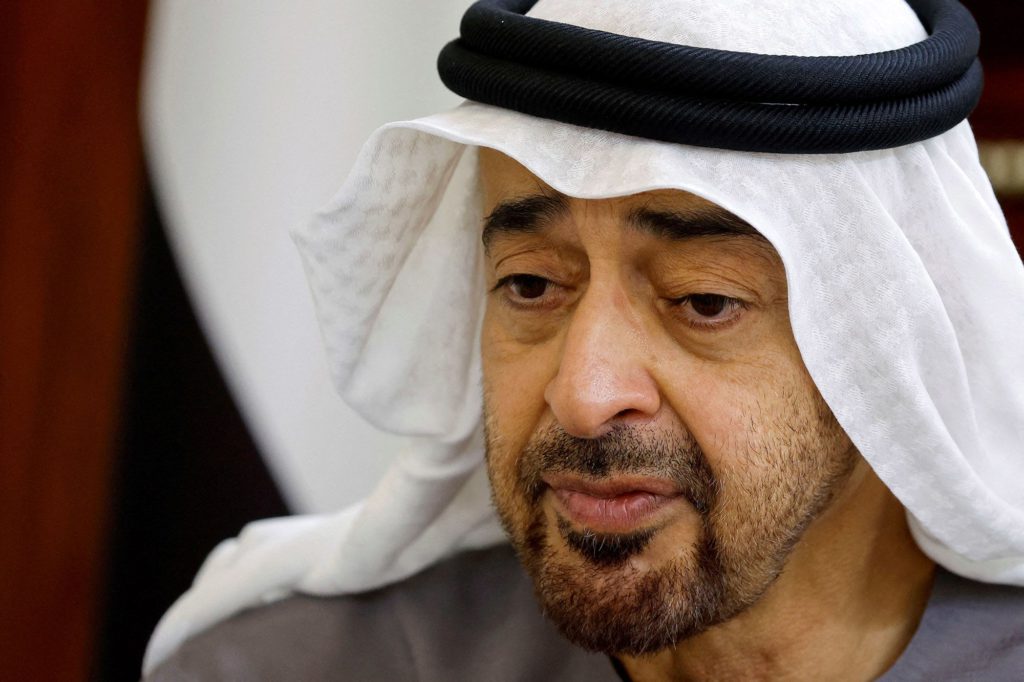(Bloomberg) — Sign up for our Middle East newsletter and follow us @middleeast for news on the region.
The Biden administration sent some of its highest-level officials to the United Arab Emirates — some for barely an hour — to pay respects to the country’s late ruler and hold talks on Monday with his successor, a transition that gives Washington a chance to sooth relations frayed over security and oil.
Vice President Kamala Harris, Secretary of State Antony Blinken, Defense Secretary Lloyd Austin and Central Intelligence Agency Director William Burns were all part of the official American delegation offering their country’s condolences.
Flying all the way from Washington, Harris spent only about an hour outside of her plane in the Gulf nation.
Blinken re-routed to the UAE after being in Europe.
The high-wattage turnout wasn’t only to pay homage to a vital US ally in the region. The visits aimed to build on efforts behind the scenes to strengthen the bilateral relationship, a US official said.
“This stature and rank of this delegation is normally sent only to the closest of American allies,” said Norman Roule, a former senior CIA official who’s now a non-resident Fellow at the Belfer Center for Science and International Affairs at Harvard.
“The makeup of this group is meant to make a statement,” he said.
The US outreach also gives the administration a chance to show that its foreign policy bandwidth isn’t entirely taken by events in Ukraine and that it knows even its domestic challenges — inflation and high fuel costs chiefly among them — can be aided by a stronger relationship with Gulf allies.
“This is a security relationship, this is a green energy relationship, this is a foreign-policy relationship.
That’s the message the US is sending to Emiratis, the GCC, Iran, and the region, but also Russia and China,” Roule said.
And it wasn’t just the US: UK Prime Minister Boris Johnson and French President Emmanuel Macron are among the world leaders offering their condolences and meeting with new ruler Sheikh Mohammed bin Zayed Al Nahyan.
That is on top of Saudi Arabia Crown Prince Mohammed Bin Salman, who the Saudi Press Agency said was flying in on behalf of his father, the king.
Sheikh Mohammed, who has long controlled the levers of power in the UAE, presides over the world’s fourth-richest wealth fund and about 6% of proven reserves of crude oil.
A powerful regional figure, he’s frequently used his clout to intervene in regional conflicts with one of the Middle East’s best-equipped militaries.
UAE Prince Who Reshaped Region Named Ruler of Oil-Rich Power
It wasn’t immediately clear whether any American officials would cross paths with Crown Prince Mohammed, the de facto Saudi ruler who Biden has so far refused to speak with directly.
The US blames the crown prince for ordering the killing of Washington Post columnist Jamal Khashoggi in 2018, though pressure has built on the Biden administration to foster better ties with the kingdom in order to rein in energy prices.
The US has urged Gulf states to pump more crude as Russia’s invasion of Ukraine convulses global markets, only to be rebuffed by regional leaders who say their oil-production alliance with Russia limits room for maneuver.
There are other stresses on the relationship as well.
Riyadh and Abu Dhabi oppose Washington’s moves to reenter a nuclear deal between Iran and world powers, saying it will embolden Iran’s regional proxies like the Houthi rebels in Yemen. Tensions also escalated after attacks on the two Gulf states by Iranian-backed Houthis as the fighters confront a Saudi-led military alliance seeking to oust them from the Yemeni capital.
The UAE transition leaves open so far the question of who will become the new crown prince of the emirate of Abu Dhabi and effective new leader-in-waiting.
The brother of the new ruler, influential National Security Adviser Sheikh Tahnoon bin Zayed, is a contender.
One of the ruler’s sons could also be chosen, including Sheikh Khaled bin Mohammed bin Zayed, whose responsibilities have grown in recent years.
The next generation faces major challenges, including how to continue the UAE’s energy transition and meet its 2050 net-zero target, the first announced by a major Gulf crude producer.
More stories like this are available on bloomberg.com
©2022 Bloomberg L.P.











